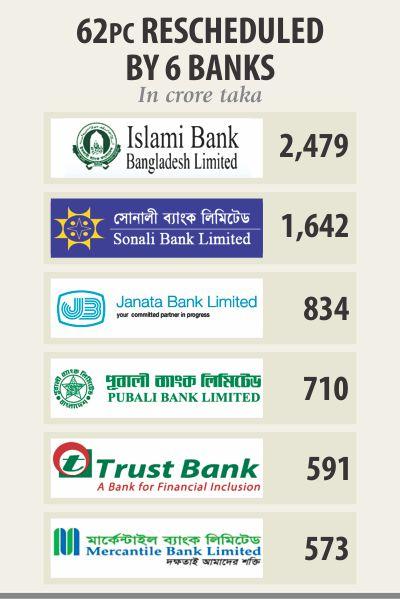Loan rescheduling soars 30pc

Loan rescheduling soared about 30 percent to Tk 10,963 crore in the first nine months of 2018, fuelling further fears for the sector.
Six banks accounted for 62 percent of the total rescheduled loans between January and September last year, according to data from the Bangladesh Bank.
Between 2012 and 2017, banks rescheduled loans amounting to Tk 89,515 crore.
The rise in loan rescheduling in recent times has created extra pressure on the banking sector, analysts said.
Bankers should change their mindset as many of them have offered loans to clients without verifying their actual business condition, said Salehuddin Ahmed, a former BB governor.
“The banking sector has taken a heavy toll because of this attitude,” he said.
Banks have to take prior approval from the central bank when they reschedule any amount of classified loans bypassing rules.
But in recent years habitual defaulters have put pressure on the central bank to reschedule their non-performing loans by sidestepping banking rules, said a BB official.
The central bank's financial stability reports for 2016 and 2017 also expressed concern about the growing tendency of loan rescheduling in the banking sector.
Poor due diligence, influenced lending, fraud and negligence in compliance with risk management practices could be the reasons for the rise in rescheduled loans, according to the reports.
Piling up of rescheduled loans seems to be a matter of concern though the banks are expected to be cooperative in assisting viable customers to sustain during difficult times by keeping their loans performing, said the reports.
Ahmed also agreed that banks should extend their cooperation to defaulters whose businesses are in crisis for genuine reasons.
Lenders should reschedule the default loans after scrutinising the cash flow of the businesses owned by defaulters, said Syed Mahbubur Rahman, chairman of the Association of Bankers, Bangladesh, a platform of commercial banks' managing directors.
“Otherwise, the rescheduled loans will turn into NPL again.”
If the lenders reschedule loans following all rules and regulations the interest income of banks gets a boost, said Rahman, also the managing director of Dhaka Bank.
Trust Bank has rescheduled the default loans as part of the management of its non-performing loans, said Faruq Mainuddin Ahmed, its managing director.
Some businesses who take large loans from banks sometimes fail to pay instalments on time, he said.
“If we do not offer them rescheduling facility they will enter the default zone despite having a good attitude when it comes to business operation,” he added.
